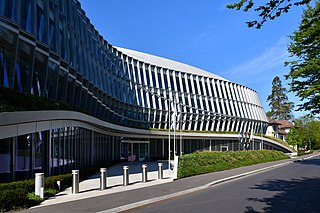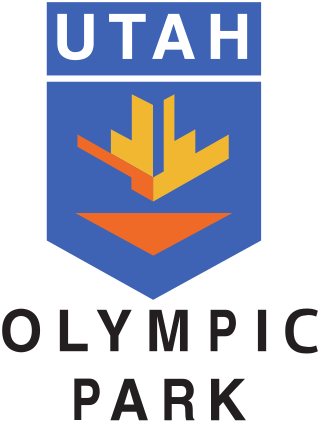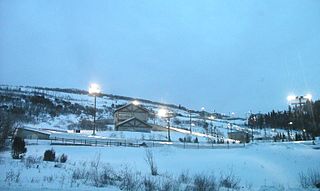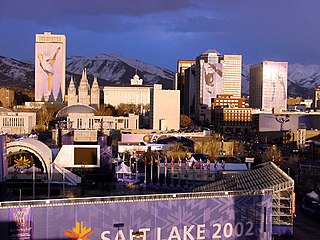
The International Olympic Committee is the international, non-governmental, sports governing body of the modern Olympic Games. Founded in 1894 by Pierre de Coubertin and Demetrios Vikelas, it is based in Lausanne, Switzerland. The IOC is the authority responsible for organizing the Summer, Winter, and Youth Olympics. The IOC also is the governing body of the National Olympic Committees (NOCs) and of the worldwide Olympic Movement, the IOC's term for all entities and individuals involved in the Olympic Games. As of 2020, 206 NOCs officially were recognized by the IOC. The IOC president has been Thomas Bach since 2013.

The modern Olympic Games are the world's leading international sporting events. They feature summer and winter sports competitions in which thousands of athletes from around the world participate in a variety of competitions. The Olympic Games are considered the world's foremost sports competition, with more than 200 teams, representing sovereign states and territories, participating. By default, the Games generally substitute for any world championships during the year in which they take place. The Olympic Games are held every four years. Since 1994, they have alternated between the Summer and Winter Olympics every two years during the four-year Olympiad.

The Winter Olympic Games is a major international multi-sport event held once every four years for sports practiced on snow and ice. The first Winter Olympic Games, the 1924 Winter Olympics, were held in Chamonix, France. The modern Olympic Games were inspired by the ancient Olympic Games, which were held in Olympia, Greece, from 776 BCE to 394 CE. The Baron Pierre de Coubertin of France founded the International Olympic Committee (IOC) 1,500 years later in 1894, leading to the first modern Summer Olympic Games in Athens, Greece in 1896. The IOC is the governing body of the Olympic Movement, with the Olympic Charter defining its structure and authority. The original five Winter Olympic Sports were bobsleigh, curling, ice hockey, Nordic skiing, and skating. The Games were held every four years from 1924 to 1936, interrupted in 1940 and 1944 by World War II, and resumed in 1948. Until 1992, the Summer Olympic Games and the Winter Olympic Games were held in the same year. A decision to change this was made in 1986, when during the 91st International Olympic Committee session, IOC members decided to alternate the Summer Olympic Games and the Winter Olympic Games on separate four-year cycles in even-numbered years. Also, at that same congress it was decided that 1992 Winter Olympics would be the last to be held in the same year as the Summer Games and that to change the rotation, the games that would be held in 1996 would be brought forward by two years, being scheduled to 1994. After those games, the next were to be held in 1998 when the four-year Olympic Cycle resumed.

The 2002 Winter Olympics, officially the XIX Olympic Winter Games and commonly known as Salt Lake 2002, were an international winter multi-sport event that was held from February 8 to 24, 2002, in and around Salt Lake City, Utah, United States.

National Olympic Committees that wish to host an Olympic Games select cities within their territories to put forth bids for the Olympic Games. The staging of the Paralympic Games is automatically included in the bid. Since the creation of the International Olympic Committee (IOC) in 1894, which successfully appropriated the name of the Ancient Greek Olympics to create a modern sporting event, interested cities have rivaled for selection as host of the Summer or Winter Olympic Games. 51 different cities have been chosen to host the modern Olympics: three in Eastern Europe, five in East Asia, one in South America, three in Oceania, nine in North America and all the others in Western Europe. No Central American, African, Central Asian, Middle Eastern, South Asian, or Southeast Asian city has ever been chosen to host an Olympics.
Peaks Ice Arena is an indoor ice hockey and figure skating arena in Provo, Utah, located 43 miles (69 km) south of Salt Lake City. Along with the Maverik Center in West Valley City, it was built as an ice hockey and figure skating practice venue for the 2002 Winter Olympics. It currently serves as the home of the Utah Valley University men’s ice hockey team, Peaks Youth Hockey Association, several high school teams, the Peaks Figure Skating Club, and a Learn-to-Skate USA program for beginning skaters of all ages.

Five cities made presentations to the IOC Session in Monte Carlo to host the 2000 Summer Olympics. The Games were awarded to Sydney, New South Wales, Australia, on 23 September 1993 at 18:17 UTC. The other cities were Beijing (China), Manchester, Berlin (Germany) and Istanbul (Turkey). 11 days earlier in a different process, Sydney had been chosen by the International Paralympic Committee to host the 2000 Summer Paralympics in Berlin, Germany.

Four cities made the shortlist with their bids to host the 2002 Winter Olympics, which were awarded to Salt Lake City, Utah, United States, on June 16, 1995. The other cities shortlisted by the IOC Selection Committee chaired by Thomas Bach were Sion, Switzerland; Östersund, Sweden; and Quebec City, Quebec, Canada. The host city selection procedure to for the 2002 Winter Olympics faced a scandal regarding the interactions between the Salt Lake City bid team and International Olympic Committee (IOC) members; ten IOC members resigned as a result, as did Salt Lake City bid leaders Tom Welch and Dave Johnson. Nevertheless, Salt Lake City overwhelmingly won the right to host the Games, needing only one round to gain the absolute majority of the votes.

The Utah Olympic Oval is an indoor speed skating oval located 14 miles (23 km) southwest of Salt Lake City, in Kearns, Utah. The Oval was built for the 2002 Winter Olympics and it hosted the long-track speed skating events for the 2002 games, a role it is expected reprise for the 2034 Winter Olympics.

The Utah Olympic Park is a winter sports park built for the 2002 Winter Olympics, and is located in Summit County northwest of Park City, Utah, United States. During the 2002 games the park hosted the bobsleigh, skeleton, luge, ski jumping, and Nordic combined events. It still serves a training center for Olympic and development level athletes.

The Utah Olympic Park Track is a bobsleigh, luge, and skeleton track in the United States, located in the Utah Olympic Park near Park City, Utah. During the 2002 Winter Olympics in nearby Salt Lake City, the track hosted the bobsleigh, luge, and skeleton events. Today the track still serves as a training center for Olympic and development level athletes and hosts numerous local and international competitions. It is one of two national tracks; the other is at Mt. Van Hoevenberg near Lake Placid, New York.
Fraser Bullock is an American entrepreneur who is a partner of Sorenson Capital and former COO of the Salt Lake Organizing Committee (SLOC) of the 2002 Winter Olympics. He is the current president and CEO of the Salt Lake City-Utah Committee for the Games, bidding for the 2030 Winter Olympics. Prior to joining the SLOC, Bullock had run his own private equity firm.
The Salt Lake Organizing Committee for the Olympic and Paralympic Winter Games of 2002 (SLOC) was the organization responsible for the 2002 Winter Olympics and 2002 Winter Paralympics in Salt Lake City, USA. The SLOC secured their bid for the 2002 Olympic Games in 1995. After the SLOC was exposed to be in disarray in the ensuing years, Mitt Romney was hired in 1999 to turn around the failing organization. Under Romney's leadership, the SLOC ended up hosting a successful Olympic games with financial surpluses.

The 2002 Winter Olympic Games were held in and around Salt Lake City, United States from February 8 to 24, 2002, and the Paralympics from March 7 to 16, 2002. The sporting events were held in ten competitive venues, while non-competitive events, such as the opening ceremony, were held in six other venues. Three venues were also created for training purposes. All Olympic venues were scattered throughout Northern Utah and the Wasatch Front.

The selection process for the 1998 Winter Olympics consisted of five bids, and saw Nagano, Japan, be selected ahead of Salt Lake City, Utah, United States; Östersund, Sweden; Jaca, Spain; and Aosta, Italy. The selection was made at the 97th IOC Session in Birmingham, United Kingdom, on 15 June 1991.
Tasuku Tsukada was a Japanese politician, and past mayor of the city of Nagano, the capital of Nagano Prefecture, in central Japan. Tsukada won his first mayoral contest in 1985. He served four full 4-year terms, until November 10, 2001. In 1997, Tsukada served as the Vice President of the Japan Association of City Mayors.
The closing ceremony of the 1998 Winter Olympics took place at Nagano Olympic Stadium, Nagano, Japan, on 22 February 1998. It began at 18:00 JST and finished at approximately 19:41 JST. As mandated by the Olympic Charter, the proceedings combines the formal and ceremonial closing of this international sporting event, including farewell speeches and closing of the Games by IOC President Juan Antonio Samaranch. The Olympic flame has been extinguished.
The 2034 Winter Olympics, officially known as the XXVII Olympic Winter Games and branded as Salt Lake City–Utah 2034, is an upcoming international multi-sport event scheduled to take place in the Salt Lake City metropolitan area of Utah in the United States, from February 10–26, 2034. The Salt Lake City–Utah bid was elected at the International Olympic Committee's (IOC) 142nd Session in Paris on July 24, 2024, two days before the start of the 2024 Summer Olympics.

The selection of the host for the 2034 Winter Olympics saw a new process being introduced from 2019. The bidding process saw the Salt Lake City and the state of Utah in the United States, chosen as the preferred and expected host that was officially certified by the IOC before the 2024 Summer Olympics on 24 July 2024 in Paris, France.










